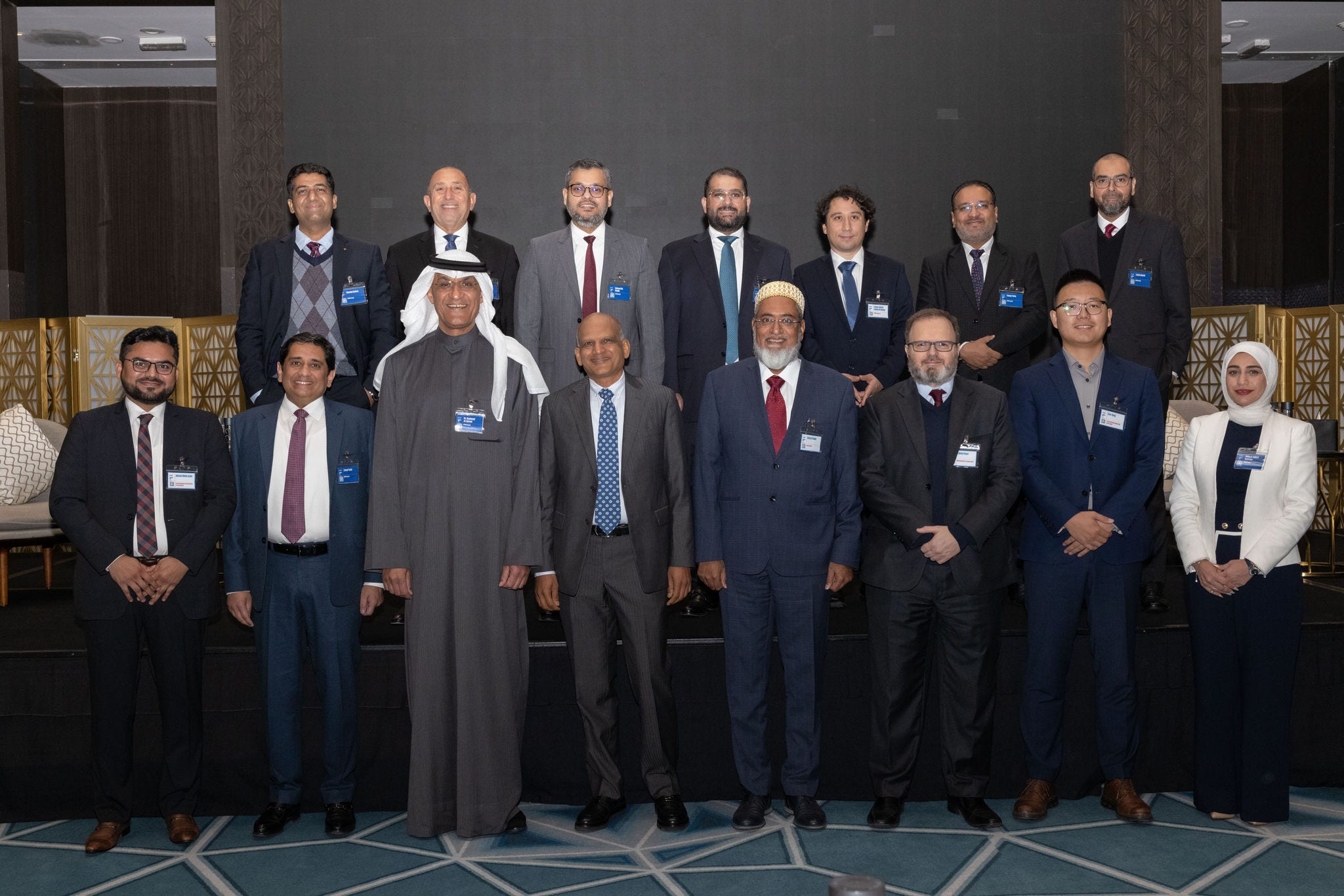 Top (from left to right): Naveen Bohra, Director — Tax & Corporate Services, KPMG Kuwait, Aref Judeh, Partner — Audit, KPMG Kuwait, Salman BinKhalid, Partner — Audit, KPMG Kuwait, Omar Ahmad, Associate Director — Tax & Corporate Services, KPMG Kuwait, Jorge Santos Lopes de Sousa, Manager, KPMG Deutschland, Muhammad Hanan Tariq, Partner — Tax & Corporate Services, KPMG Kuwait, and Fahim Bashir, Partner — Tax & Corporate Services, KPMG Kuwait; and Bottom (from left to right): Aleem Ullah Azim, Group Finance Manager, Fouad Alghanim Group of Companies, Zubair Patel, Partner and Head — Tax & Corporate Services, KPMG Kuwait, Dr. Rasheed Al-Qenae, Managing Partner, KPMG Kuwait, Sanjay Khetan, Group CFO, Alshaya, Kaizar Shakir, Director and CFO, Gulf Consult and Chairman of Indian Business and Professional Council Kuwait, Daniel Kaye, Group Chief Economist, National Bank of Kuwait, Kuo Yang, Vice President, Jereh Oil & Gas Engineering Corporation, and Heba Abdelrahman, Associate Director — Tax & Corporate Services, KPMG Kuwait
Top (from left to right): Naveen Bohra, Director — Tax & Corporate Services, KPMG Kuwait, Aref Judeh, Partner — Audit, KPMG Kuwait, Salman BinKhalid, Partner — Audit, KPMG Kuwait, Omar Ahmad, Associate Director — Tax & Corporate Services, KPMG Kuwait, Jorge Santos Lopes de Sousa, Manager, KPMG Deutschland, Muhammad Hanan Tariq, Partner — Tax & Corporate Services, KPMG Kuwait, and Fahim Bashir, Partner — Tax & Corporate Services, KPMG Kuwait; and Bottom (from left to right): Aleem Ullah Azim, Group Finance Manager, Fouad Alghanim Group of Companies, Zubair Patel, Partner and Head — Tax & Corporate Services, KPMG Kuwait, Dr. Rasheed Al-Qenae, Managing Partner, KPMG Kuwait, Sanjay Khetan, Group CFO, Alshaya, Kaizar Shakir, Director and CFO, Gulf Consult and Chairman of Indian Business and Professional Council Kuwait, Daniel Kaye, Group Chief Economist, National Bank of Kuwait, Kuo Yang, Vice President, Jereh Oil & Gas Engineering Corporation, and Heba Abdelrahman, Associate Director — Tax & Corporate Services, KPMG Kuwait
January 2025, Kuwait: KPMG Kuwait wrapped up the latest edition of its annual flagship tax event Talking Tax on 15 January 2025, with a participation of nearly 200 clients and business from Kuwait. Following the recent changes announced in Kuwait’s tax legislation with regards to BEPS (Base Erosion and Profit Shifting) Pillar 2 and Domestic Minimum Top-up Tax Law (‘DMTT’ Law), the event aimed to support multinational enterprises (MNEs) and large-sized organizations in Kuwait navigate the resulting challenges.
Opening the event, Dr. Rasheed Al-Qenae, Managing Partner, KPMG Kuwait, called the announcement of the DMTT law “a measure to help fulfill Kuwait’s commitments to bring about tax reforms and better alignment with global tax standards” to usher in a new era of tax transparency in the country. On 15 November 2023, Kuwait had signed the OECD/G20 Inclusive Framework on BEPS, joining 140 members countries and jurisdictions in the global efforts towards tax transparency. This year, on 1 January 2025, Kuwait began the implementation process subjecting every MNE with a consolidated revenue above EUR750 Million in Kuwait to a minimum 15% tax.
Talking Tax 2025 emphasized that coping with the challenges stemming from the said changes in Kuwait’s tax legislation requires timely and effective preparation.
Zubair Patel, Partner and Head — Tax & Corporate Services, KPMG Kuwait, echoed this in his address and said, “Kuwait's new DMTT Law is a landmark step in aligning with global tax standards, ensuring MNEs contribute fairly. The BEPS Pillar 2 initiative is a game-changer in global tax equity, ensuring that MNEs contribute their fair share. Prepare, adapt, and lead in this new tax era.”
The event also underlined that taking measures, such as an impact assessment, to understand the effect of Pillar 2 on an organization’s global effective tax rate, cash tax cost and compliance burden can help identify potential gaps in organizational frameworks, enabling them to better evaluate the data requirements and associated data structure and systems needed to conform to Pillar 2.
“With the introduction of the DMTT Law, Kuwait joins the global movement towards fair taxation. With BEPS Pillar 2, the focus is on leveling the playing field for MNEs. It's time to rethink tax strategies and ensure compliance with the global minimum tax,” said Fahim Bashir, Partner — Tax & Corporate Services, KPMG in Kuwait.
During his on-stage discussion on the impact of BEPS and Pillar 2 with Naveen Bohra, Director — Tax & Corporate Services, KPMG in Kuwait, and Jorge Santos Lopes de Sousa, Manager, KPMG Deutschland, Fahim elucidated on this aspect and shared key information pertaining to the importance of BEPS and Pillar 2, their rule order, and operating structures in Kuwait, among others.
One of the main points that Talking Tax 2025 drove home was the potential role emerging technologies like artificial intelligence (AI) may play in shaping the tax landscape. Capitalizing on it will require MNEs to assess how they can better embed technology into their tax functions and train their resources on the new tax laws. Despite the challenges that MNEs may have to navigate in the wake of changes to Kuwait’s tax ecosystem, KPMG professionals feel these shifts bear the potential for development and adherence to global tax standards.
Muhammad Hanan Tariq, Partner — Tax & Corporate Services, KPMG Kuwait, said, “The DMTT Law prompts organizations to rethink their tax strategies and compliance frameworks. It's an opportunity for growth and alignment with international best practices. The implementation of BEPS Pillar 2 challenges organizations to lead strategically in the evolving tax landscape.”
The seventh edition of Talking Tax highlighted that while the complete picture of the new tax laws remains to be seen, MNEs and professionals must put in concerted efforts and seek inspiration from the wider region to transition into the new tax ecosystem seamlessly.

